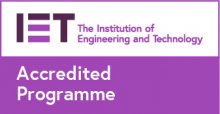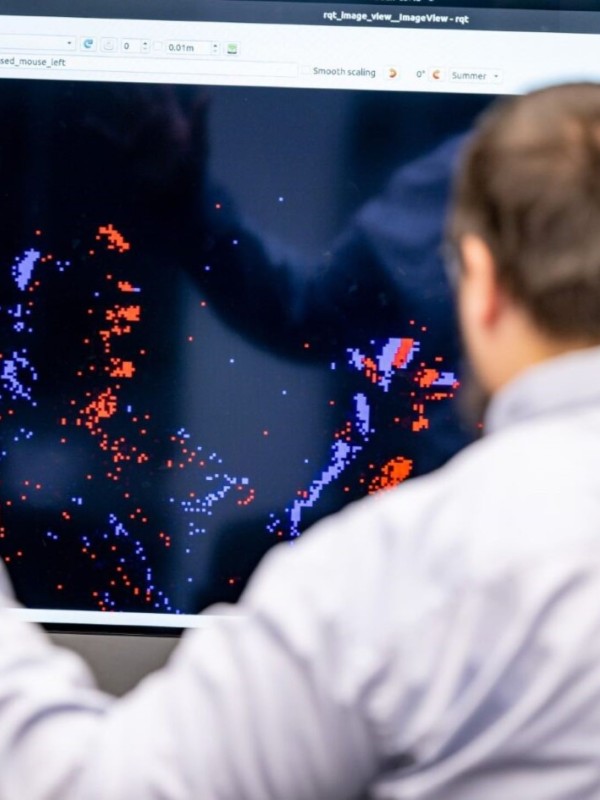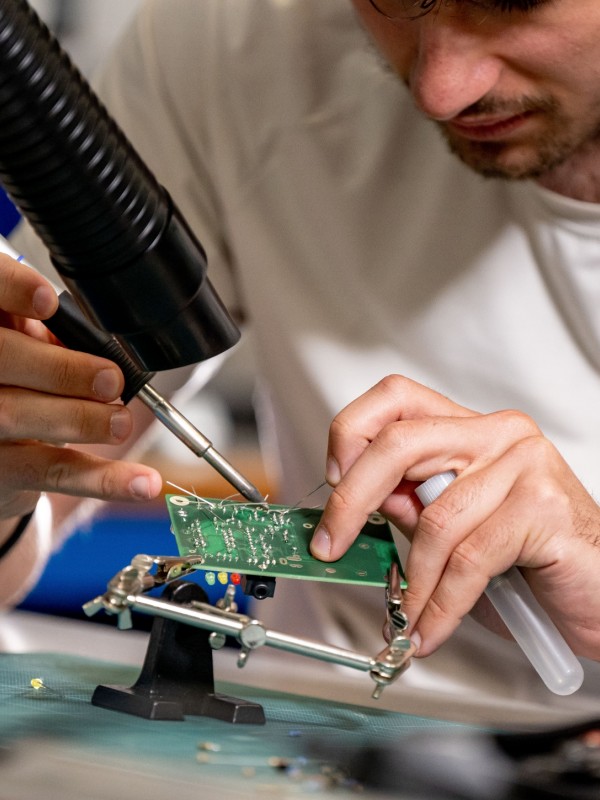
- Intelligent Communication Systems and Networks
MSc — 2025 entry Intelligent Communication Systems and Networks
Our Intelligent Communication Systems and Networks MSc combines Artificial Intelligence (AI) and advanced communication technologies to meet industry demand for future networks. With flexible module pathways, students gain both foundational knowledge and specialised expertise, preparing them for careers in AI-driven networking, wireless systems, cybersecurity, and intelligent communications.
Why choose
this course?
- Cutting-edge curriculum: Stay ahead with a program integrating AI, machine learning, and foundations of communication systems, designed to meet evolving industry needs.
- Flexible learning pathways: choose between gaining broad expertise or specialising in areas like intelligent networking, security or wireless communication.
- Industry-relevant skills: this MSc will put you at the forefront of the evolving and exciting sector of AI-driven communications and intelligent networks. Developed in collaboration with industry partners, the program prepares graduates for high-demand roles. At Surrey, we’re internationally recognised in future connectivity, with our pioneering 5G/6G Innovation Centre being home to the world’s largest academic research group specializing in 5G, 6G, satellite communications, IoT, UAV communications, connected transportation, and AI for communications.
- Career and placement opportunities: Benefit from strong industry links, real-world projects, and excellent employability prospects in telecom, AI, and networking sectors.
Statistics
96%
of our electrical and electronic engineering postgraduate taught students go on to employment or further study (Graduate Outcomes 2024, HESA)

What you will study
Our MSc will enable you to understand the engineering aspects of this rapidly developing field, as well as emerging systems:
- Compulsory modules cover Fundamentals of Machine Learning for Communications, Wireless Communication Principles, and Network Planning and Management.
- Optional modules allow for a variety of specialisation in Artificial Intelligence of Things and Data and Internet Networking, Radio Frequency Engineering and Antennas and Propagation, Advanced Wireless Techniques, Cloud Computing, and Network Security and Cloud Security.
We’re home to the world’s largest academic research group in 5G and 6G communications. Its founding members include the UK’s major mobile operators, so you’ll be exposed to advanced communications and study modules.
Professional recognition
MSc - Institution of Engineering and Technology (IET)
Accredited by the Institution of Engineering and Technology (IET) on behalf of the Engineering Council for the purposes of fully meeting the academic requirement for registration as an Incorporated Engineer and partially meeting the academic requirement for registration as a Chartered Engineer.
Research
Our School of Computer Science and Electronic Engineering is home to the Institute for Communication Systems. This houses more than 100 researchers working across many communication technologies, including the ‘internet of things’, satellite, security and radio, as well as its core research hub – the 5G/6G Innovation Centre (5G/6GIC).
Facilities
Surrey is home to the 5G/6G Innovation Centre. The Centre brings together leading academics and key industry partners in a shared vision to help define and develop the 5G/6G infrastructure that will underpin the way we communicate, work and live our everyday lives.
The facilities within the Centre include:
- Networks Lab Testbed
- Link and system level simulators
- Antennas and Signal Processing Lab
- Wireless Network Testbed
- Campus Testbed
You will also have access to our open access PC labs and specialist computer suites.
If you’re studying this course full-time, you’ll study eight modules across the year – four in each semester. You will work on your project full time during the summer period for approximately two and a half months, whilst prior to that during semester time you will work on the initial stages of the project part time and complete an interim report. This means that if you begin your course in February, you will complete your project in between the two semesters, while if you begin your course in September, you will complete your project after the two semesters.
You can also study this MSc part-time, taking between two and five years. The length depends on how many modules you study each year. You can study between two and six modules each year. We recommend part-time students work on their project in their final year of study when all eight modules have either been completed or are near completion.
The structure of our programmes follows clear educational aims that are tailored to each programme. These are all outlined in the programme specifications which include further details such as the learning outcomes:
Modules
Modules listed are indicative, reflecting the information available at the time of publication. Modules are subject to teaching availability, student demand and/or class size caps.
The University operates a credit framework for all taught programmes based on a 15-credit tariff, meaning all modules are comprised of multiples of 15 credits, up to a maximum of 120 credits.
Course options
Year 1
Semester 1
Compulsory
Expected prior learning: It is helpful, but not essential, to have taken module EEE2040 – Communications Networks (EEE2040), or to have equivalent learning. Module purpose: This module deals with the three important processing stages of modern digital communication systems which are source coding for signal compression, channel error control coding for robust transmission and modulation for efficient digital interface with the available channel. The module is designed to provide basic-to-intermediate scale introduction of the subject at the UG level and the learning developed in this module can be enhanced further at relevant MEng / MSc level modules (EEEM017, EEEM030, EEEM031)
View full module detailsExpected prior/parallel learning: It is helpful, but not essential, to take module EEE3006 – Digital Communications, or to have equivalent learning. Module purpose: This module equips students with fundamental knowledge and skills of mobile/personal communications systems design and forms the basis for the students to conduct further learning of advanced mobile technologies in EEEM018 – Advanced Mobile Communication Systems and EEEM061 – Advanced 5G Wireless Technologies.
View full module detailsOptional
Expected prior/parallel learning: Basic knowledge of hardware systems and module EEE2047 (Object-Oriented Programming and C++) or equivalent knowledge of C++ or Java programming. Module purpose: Advances related to energy efficiency issues and cost reductions have resulted in the rapid growth and deployment of networked devices and sensing/actuation systems that connect the physical world with the cyber world. The resulting framework, known as the Internet of Things (IoT), incorporates several technologies, including wireless sensor networks, pervasive systems, ambient intelligence, context awareness, and distributed systems. The advanced IoT module is designed to provide a comprehensive understanding of how machine communications contribute to creating smart, artificial intelligence-driven environments focusing on networking and communication systems. The module provides an overview of the key concepts and enabling technologies for the Internet of Things. It encompasses a cross-layer approach, allowing students to explore the practical aspects of sensors, actuators, and mainly communication systems for IoT across physical, media access, and network layers. This includes security considerations, satellite IoT, positioning and tracking for industrial applications, IoT Platforms (Hardware, Software), protocols and standards (e.g. 6LowPAN, ZigBee, CoAp), semantic technologies, and data and information processing mechanisms. Â Also, the module seamlessly integrates cutting-edge machine learning techniques tailored for IoT applications, ensuring optimal performance and adaptability.
View full module detailsExpected prior / parallel learning: We expect you to ideally have some background in arithmetic, algebra, complex numbers, integration, and differentiation to follow this module. Besides, you will find it helpful to have some knowledge about linear systems, linear algebra and stochastic processes for following. Module purpose: This module focuses on some of the fundamental mathematical concepts used in the analysis and design of modern digital communications systems and examines their application to link-level communications and receiver designs. Related modules: EEEM017 - Fundamentals of Mobile Communications: EEEM062 is complementary with EEEM017, since EEEM017 covers other fundamental aspects of communication system design like data rate and some system level aspects, e.g. resource allocation. Mathematics taught in EEEM062, i.e. probability, is useful to understand the theory behind data rate taught in EEEM017. EEEM018 - Advanced Mobile Communication Systems: EEEM062 provides link level knowledge of communication systems that complements well with the system level knowledge taught in EEEM018. EEEM061 - Advanced 5G Wireless Technologies. Mathematics taught in EEEM062, i.e. linear algebra and matrix, is useful to understand the theory behind massive multiple-input multiple output communication systems (part of 5G system) taught in EEEM061. Similarly, Fourier analysis taught in EEEM062, is useful to understand the theory behind orthogonal frequency division multiplexing (part of 5G system) taught in EEEM061. EEE1032 - Mathematics II: Engineering mathematics and EEE2035 - Engineering mathematics III: Some of the mathematic topics covered in 1st and 2nd years (e.g. Fourier analysis, Probability, Algebra) are similar to some of those taught in EEEM062, but these topics are specially adapted to communications in EEEM062 to provide a level-playing field for students joining us at MSc level and who have not necessarily already acquired this background knowledge in their previous studies.
View full module detailsIMPORTANT: The second assessment pattern is only applicable to the MSc Short Course Students Expected prior learning: EEE3033 – RF and Microwave Fundamentals, or equivalent learning. Module purpose: Advanced communications systems and radar operate at RF and microwave frequencies. The design principles and circuit operation, underlying these systems, are quite different from those of electronics used in signal processing at baseband frequencies. This module will cover the key elements of RF and microwave system design as well as analysis concepts for a range of commonly used active circuits, including: oscillators, frequency synthesisers, amplifiers and mixers. The module will also cover the circuit design and operation of non-linear devices used in active circuits together with deployment considerations. This module will include and build on many of the concepts studied in EEE3033 RF and Microwave Fundamentals and address further advanced features of non linear RF devices and system optimisation. It is complementary to EEEM064 Microwave Design Techniques and also EEEM006 Antennas and Propagation.
View full module detailsSemester 2
Compulsory
Expected prior/parallel learning: N/A Module purpose: Mobile communications systems have been among the fastest growing sectors of the global economy in the past decade and are expected to drive tremendous developments in the upcoming decade. Modern mobile communication systems employ a range of advanced wireless communication techniques and networking technologies/protocols to deliver high rate and high-quality services for a variety of mobile applications. This module aims to cover a number of key advanced concepts that are either used in the modern mobile communication systems or expected to be deployed in the future. Module EEEM018 benefits from Module EEE3007 Data and Internet Networking in relation to Internet protocols.
View full module detailsCore
This module is aimed at forming essential professional skills and competences in research and innovation for master level students studying in programmes relating to computer science and/or electronic engineering. It will therefore serve as an important initial module towards planning and executing the dissertation project through learning about literature reviewing and research methodologies. Furthermore, it will facilitate team building skills through identifying individual strengths and exercising capability through group design work. This experience will also make the student aware of the challenges of working effectively with other people.
View full module detailsOptional
This module teaches cloud computing concepts and the security of the cloud platform to enable students to understand how to secure workloads on cloud. The topics including basic concepts and the core security services needed to secure workloads and the processing of sensitive data. To re-enforce learning, the module will require students to work in teams to configure the cloud platform using infrastructure automation.
View full module detailsThe module introduces general information and network security principles, challenges and goals and then focuses on main security mechanisms and protocols for protecting network communication across different layers of the Internet protocol stack. This will include discussion on various attacks on the networks, penetration testing tools and possible countermeasures to ensure protection of authentication, confidentiality and end-to-end security of communications. In labs students will be able to practice experience with various network security protocols and tools.
View full module detailsIMPORTANT: The second assessment pattern is only applicable to the MSc Short Course Students Expected prior learning: None. Module purpose: Antennas and the propagation of radio on the physical layer (PHY) are a fundamental aspect of communications, space and radar as well as any other device that will radiate electromagnetic waves over an air interface. In order for wireless devices to operate and comply with suitable standards, it is important that they use a suitable antenna design, while also modelling the propagation environment the device may encounter is important for purposes of testing the radio transceiver, thus knowledge of propagation modelling is required to achieve this.
View full module detailsExpected prior learning: Module EEE2040 – Communications Networks or equivalent learning. Module purpose: The Internet is an important worldwide communications system; the module provides an in-depth treatment of current and evolving Internet protocols and standards, and the algorithms that underlie them. The module also permits further study on networking in modules such as EEEM018 Advanced Mobile Communication Systems, EEEM023 Network Service management and Control, EEEM032 Advanced Satellite Communication Techniques
View full module detailsExpected prior/parallel learning: It is helpful but not essential to have knowledge of linear algebra, probabilities and stochastic processes as well as fundamental skills in computer programming and have studied EEEM017 - Fundamentals of Mobile Communications, EEE3006 Digital Communications and EEEM062 – Applied Mathematics for Communication Systems. Module purpose: The purpose of this module is to provide students with knowledge related to some of the key, advanced concepts adopted in the current generation of mobile and wireless communications systems (e.g., 5G), as well as to advanced concepts that have a strong potential to shape the future generations of mobile systems (e.g., 6G). This will ensure that the students completing this module will have the necessary knowledge and ability for starting to work on the 5G technology in industry or furthering their understanding via a research degree. This module brings together knowledge that students may have acquired in other modules (EEEM017 - Fundamentals of Mobile Communications, EEE3006 Digital Communications and EEEM062 – Applied Mathematics for Communication Systems) and assists in making cognitive and conceptual connections between this previously taught fundamental knowledge in wireless communications, and the corresponding state-of-the-art techniques.
View full module detailsSemester 1 & 2
Core
Expected prior learning: Appropriate background knowledge related to the project topic. Module purpose: This is an individual student project module giving each masters student an opportunity to gain realistic experience in developing a solution to a problem from its inception to a demonstrable result. It provides a framework as well as a vehicle for exercising all key aspects of project work, from project specification, through literature and technology research, leading to project planning, problem solving as well as design and implementation, culminating in performance assessment, project demonstration, and project evaluation. It also provides a scope for gaining practical experience interpersonal skills, use of IT, project management, project reporting and project presentation. The project can be either of engineering design nature or have a research flavour. This module is complementary to all other taught modules in order to apply the learning gained into undertaking an independent piece of research and/or development.
View full module detailsOptional modules for Year 1 - FHEQ Levels 6 and 7
A full-time student must choose:
TWO in Semester 1
TWO in Semester 2
Unstructured years
Semester 1
Compulsory
Expected prior learning: It is helpful, but not essential, to have taken module EEE2040 – Communications Networks (EEE2040), or to have equivalent learning. Module purpose: This module deals with the three important processing stages of modern digital communication systems which are source coding for signal compression, channel error control coding for robust transmission and modulation for efficient digital interface with the available channel. The module is designed to provide basic-to-intermediate scale introduction of the subject at the UG level and the learning developed in this module can be enhanced further at relevant MEng / MSc level modules (EEEM017, EEEM030, EEEM031)
View full module detailsExpected prior/parallel learning: It is helpful, but not essential, to take module EEE3006 – Digital Communications, or to have equivalent learning. Module purpose: This module equips students with fundamental knowledge and skills of mobile/personal communications systems design and forms the basis for the students to conduct further learning of advanced mobile technologies in EEEM018 – Advanced Mobile Communication Systems and EEEM061 – Advanced 5G Wireless Technologies.
View full module detailsOptional
IMPORTANT: The second assessment pattern is only applicable to the MSc Short Course Students Expected prior learning: EEE3033 – RF and Microwave Fundamentals, or equivalent learning. Module purpose: Advanced communications systems and radar operate at RF and microwave frequencies. The design principles and circuit operation, underlying these systems, are quite different from those of electronics used in signal processing at baseband frequencies. This module will cover the key elements of RF and microwave system design as well as analysis concepts for a range of commonly used active circuits, including: oscillators, frequency synthesisers, amplifiers and mixers. The module will also cover the circuit design and operation of non-linear devices used in active circuits together with deployment considerations. This module will include and build on many of the concepts studied in EEE3033 RF and Microwave Fundamentals and address further advanced features of non linear RF devices and system optimisation. It is complementary to EEEM064 Microwave Design Techniques and also EEEM006 Antennas and Propagation.
View full module detailsExpected prior/parallel learning: Basic knowledge of hardware systems and module EEE2047 (Object-Oriented Programming and C++) or equivalent knowledge of C++ or Java programming. Module purpose: Advances related to energy efficiency issues and cost reductions have resulted in the rapid growth and deployment of networked devices and sensing/actuation systems that connect the physical world with the cyber world. The resulting framework, known as the Internet of Things (IoT), incorporates several technologies, including wireless sensor networks, pervasive systems, ambient intelligence, context awareness, and distributed systems. The advanced IoT module is designed to provide a comprehensive understanding of how machine communications contribute to creating smart, artificial intelligence-driven environments focusing on networking and communication systems. The module provides an overview of the key concepts and enabling technologies for the Internet of Things. It encompasses a cross-layer approach, allowing students to explore the practical aspects of sensors, actuators, and mainly communication systems for IoT across physical, media access, and network layers. This includes security considerations, satellite IoT, positioning and tracking for industrial applications, IoT Platforms (Hardware, Software), protocols and standards (e.g. 6LowPAN, ZigBee, CoAp), semantic technologies, and data and information processing mechanisms. Â Also, the module seamlessly integrates cutting-edge machine learning techniques tailored for IoT applications, ensuring optimal performance and adaptability.
View full module detailsExpected prior / parallel learning: We expect you to ideally have some background in arithmetic, algebra, complex numbers, integration, and differentiation to follow this module. Besides, you will find it helpful to have some knowledge about linear systems, linear algebra and stochastic processes for following. Module purpose: This module focuses on some of the fundamental mathematical concepts used in the analysis and design of modern digital communications systems and examines their application to link-level communications and receiver designs. Related modules: EEEM017 - Fundamentals of Mobile Communications: EEEM062 is complementary with EEEM017, since EEEM017 covers other fundamental aspects of communication system design like data rate and some system level aspects, e.g. resource allocation. Mathematics taught in EEEM062, i.e. probability, is useful to understand the theory behind data rate taught in EEEM017. EEEM018 - Advanced Mobile Communication Systems: EEEM062 provides link level knowledge of communication systems that complements well with the system level knowledge taught in EEEM018. EEEM061 - Advanced 5G Wireless Technologies. Mathematics taught in EEEM062, i.e. linear algebra and matrix, is useful to understand the theory behind massive multiple-input multiple output communication systems (part of 5G system) taught in EEEM061. Similarly, Fourier analysis taught in EEEM062, is useful to understand the theory behind orthogonal frequency division multiplexing (part of 5G system) taught in EEEM061. EEE1032 - Mathematics II: Engineering mathematics and EEE2035 - Engineering mathematics III: Some of the mathematic topics covered in 1st and 2nd years (e.g. Fourier analysis, Probability, Algebra) are similar to some of those taught in EEEM062, but these topics are specially adapted to communications in EEEM062 to provide a level-playing field for students joining us at MSc level and who have not necessarily already acquired this background knowledge in their previous studies.
View full module detailsSemester 2
Compulsory
Expected prior/parallel learning: N/A Module purpose: Mobile communications systems have been among the fastest growing sectors of the global economy in the past decade and are expected to drive tremendous developments in the upcoming decade. Modern mobile communication systems employ a range of advanced wireless communication techniques and networking technologies/protocols to deliver high rate and high-quality services for a variety of mobile applications. This module aims to cover a number of key advanced concepts that are either used in the modern mobile communication systems or expected to be deployed in the future. Module EEEM018 benefits from Module EEE3007 Data and Internet Networking in relation to Internet protocols.
View full module detailsCore
This module is aimed at forming essential professional skills and competences in research and innovation for master level students studying in programmes relating to computer science and/or electronic engineering. It will therefore serve as an important initial module towards planning and executing the dissertation project through learning about literature reviewing and research methodologies. Furthermore, it will facilitate team building skills through identifying individual strengths and exercising capability through group design work. This experience will also make the student aware of the challenges of working effectively with other people.
View full module detailsOptional
The module introduces general information and network security principles, challenges and goals and then focuses on main security mechanisms and protocols for protecting network communication across different layers of the Internet protocol stack. This will include discussion on various attacks on the networks, penetration testing tools and possible countermeasures to ensure protection of authentication, confidentiality and end-to-end security of communications. In labs students will be able to practice experience with various network security protocols and tools.
View full module detailsIMPORTANT: The second assessment pattern is only applicable to the MSc Short Course Students Expected prior learning: None. Module purpose: Antennas and the propagation of radio on the physical layer (PHY) are a fundamental aspect of communications, space and radar as well as any other device that will radiate electromagnetic waves over an air interface. In order for wireless devices to operate and comply with suitable standards, it is important that they use a suitable antenna design, while also modelling the propagation environment the device may encounter is important for purposes of testing the radio transceiver, thus knowledge of propagation modelling is required to achieve this.
View full module detailsExpected prior/parallel learning: It is helpful but not essential to have knowledge of linear algebra, probabilities and stochastic processes as well as fundamental skills in computer programming and have studied EEEM017 - Fundamentals of Mobile Communications, EEE3006 Digital Communications and EEEM062 – Applied Mathematics for Communication Systems. Module purpose: The purpose of this module is to provide students with knowledge related to some of the key, advanced concepts adopted in the current generation of mobile and wireless communications systems (e.g., 5G), as well as to advanced concepts that have a strong potential to shape the future generations of mobile systems (e.g., 6G). This will ensure that the students completing this module will have the necessary knowledge and ability for starting to work on the 5G technology in industry or furthering their understanding via a research degree. This module brings together knowledge that students may have acquired in other modules (EEEM017 - Fundamentals of Mobile Communications, EEE3006 Digital Communications and EEEM062 – Applied Mathematics for Communication Systems) and assists in making cognitive and conceptual connections between this previously taught fundamental knowledge in wireless communications, and the corresponding state-of-the-art techniques.
View full module detailsThis module teaches cloud computing concepts and the security of the cloud platform to enable students to understand how to secure workloads on cloud. The topics including basic concepts and the core security services needed to secure workloads and the processing of sensitive data. To re-enforce learning, the module will require students to work in teams to configure the cloud platform using infrastructure automation.
View full module detailsExpected prior learning: Module EEE2040 – Communications Networks or equivalent learning. Module purpose: The Internet is an important worldwide communications system; the module provides an in-depth treatment of current and evolving Internet protocols and standards, and the algorithms that underlie them. The module also permits further study on networking in modules such as EEEM018 Advanced Mobile Communication Systems, EEEM023 Network Service management and Control, EEEM032 Advanced Satellite Communication Techniques
View full module detailsSemester 1 & 2
Core
Expected prior learning: Appropriate background knowledge related to the project topic. Module purpose: This is an individual student project module giving each masters student an opportunity to gain realistic experience in developing a solution to a problem from its inception to a demonstrable result. It provides a framework as well as a vehicle for exercising all key aspects of project work, from project specification, through literature and technology research, leading to project planning, problem solving as well as design and implementation, culminating in performance assessment, project demonstration, and project evaluation. It also provides a scope for gaining practical experience interpersonal skills, use of IT, project management, project reporting and project presentation. The project can be either of engineering design nature or have a research flavour. This module is complementary to all other taught modules in order to apply the learning gained into undertaking an independent piece of research and/or development.
View full module detailsOptional modules for Unstructured (3-5 years) PT - FHEQ Levels 6 and 7
A part-time student must choose:
TWO in Semester 1
TWO in Semester 2
Teaching and learning
- Lectures
- Laboratory work
- Group work
- Project work
- Research work
- Tutorials
General course information
Contact hours
Contact hours can vary across our modules. Full details of the contact hours for each module are available from the University of Surrey's module catalogue. See the modules section for more information.
Timetable
Course timetables are normally available one month before the start of the semester.
New students will receive their personalised timetable in Welcome Week, and in subsequent semesters, two weeks prior to the start of semester.
Please note that while we make every effort to ensure that timetables are as student-friendly as possible, scheduled teaching can take place on any day of the week (Monday – Friday). Wednesday afternoons are normally reserved for sports and cultural activities. Part-time classes are normally scheduled on one or two days per week, details of which can be obtained from Academic Administration.
Location
This course is based at Stag Hill campus. Stag Hill is the University's main campus and where the majority of our courses are taught.
We offer careers information, advice and guidance to all students whilst studying with us, which is extended to our alumni for three years after leaving the University.
Our electronic engineering graduates are in demand within the sector and have progressed to working in large companies including:
- 3
- British Telecom
- EE
- Huawei
- O2
- Samsung
- Telefonica
- Vodafone.
UK qualifications
A minimum of a 2:2 UK honours degree in communication engineering, computer engineering, electrical engineering, electrical and computer engineering, electronic engineering, information and communication technologies, physics or telecommunication engineering, or a recognised equivalent international qualification.
We'll also consider relevant work experience if you don't meet these requirements.
English language requirements
IELTS Academic: 6.5 overall with 6.0 in writing and 5.5 in each other element.
These are the English language qualifications and levels that we can accept.
If you do not currently meet the level required for your programme, we offer intensive pre-sessional English language courses, designed to take you to the level of English ability and skill required for your studies here.
Recognition of prior learning
We recognise that many students enter their course with valuable knowledge and skills developed through a range of ways.
If this applies to you, the recognition of prior learning process may mean you can join a course without the formal entry requirements, or at a point appropriate to your previous learning and experience.
There are restrictions for some courses and fees may be payable for certain claims. Please contact the Admissions team with any queries.
Scholarships and bursaries
Discover what scholarships and bursaries are available to support your studies.
Fees
Explore UKCISA’s website for more information if you are unsure whether you are a UK or overseas student. View the list of fees for all postgraduate courses.
September 2025 - Full-time - 1 year
- UK
- £12,400
- Overseas
- £24,900
September 2025 - Part-time - 5 years
- UK
- £1,400
- Overseas
- £2,800
- For the unstructured self-paced part-time course, the fee shown above is per 15 credits for the 2024-25 academic year
- The dissertation module is charged as a 15-credit module for fee purposes
- These fees apply to students commencing study in the academic year 2025-26 only. Fees for new starters are reviewed annually.
Payment schedule
- Students with Tuition Fee Loan: the Student Loans Company pay fees in line with their schedule (students on an unstructured self-paced part-time course are not eligible for a Tuition Fee Loan).
- Students without a Tuition Fee Loan: pay their fees either in full at the beginning of the programme or in two instalments as follows:
- 50% payable 10 days after the invoice date (expected to be October/November of each academic year)
- 50% in January of the same academic year.
- Students on part-time programmes where fees are paid on a modular basis: cannot pay fees by instalment.
- Sponsored students: must provide us with valid sponsorship information that covers the period of study.
The exact date(s) will be on invoices.
Additional costs
Books/stationery/admin: Costs may be incurred associated with the purchase of writing paper and associated stationery.
Funding
You may be able to borrow money to help pay your tuition fees and support you with your living costs. Find out more about postgraduate student finance.
Apply online
To apply online first select the course you'd like to apply for then log in.
Select your course
Choose the course option you wish to apply for.
Sign in
Create an account and sign into our application portal.
Please note that we may have to close applications before the stated deadline if we receive a high volume of suitable applications. We advise you to submit your application as soon as it is ready.
ApplyPlease note that we may have to close applications before the stated deadline if we receive a high volume of suitable applications. We advise you to submit your application as soon as it is ready.
ApplyAdmissions information
Once you apply, you can expect to hear back from us within 14 days. This might be with a decision on your application or with a request for further information.
Our code of practice for postgraduate admissions policy explains how the Admissions team considers applications and admits students. Read our postgraduate applicant guidance for more information on applying.
About the University of Surrey
Need more information?
Contact our Admissions team or talk to a current University of Surrey student online.
Terms and conditions
When you accept an offer to study at the University of Surrey, you are agreeing to follow our policies and procedures, student regulations, and terms and conditions.
We provide these terms and conditions in two stages:
- First when we make an offer.
- Second when students accept their offer and register to study with us (registration terms and conditions will vary depending on your course and academic year).
View our generic registration terms and conditions (PDF) for the 2024/25 academic year, as a guide on what to expect.
Disclaimer
This online prospectus has been published in advance of the academic year to which it applies.
Whilst we have done everything possible to ensure this information is accurate, some changes may happen between publishing and the start of the course.
It is important to check this website for any updates before you apply for a course with us. Read our full disclaimer.









